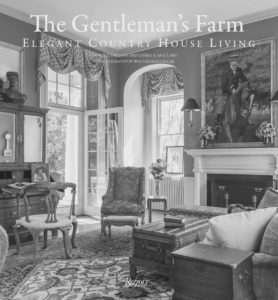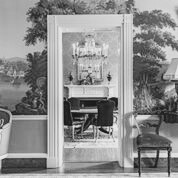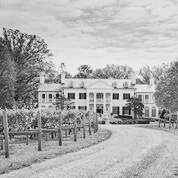Adapted by Keswick Life
 Historically, a gentleman’s farm has evoked visions of leisure, recreation, a refined landscape, classical architecture, and a robust social environment. The Gentleman’s Farm: Elegant Country House Living (Rizzoli, 2016) presents 23 Virginia farms that live up to and exceed those expectations. Lavishly illustrated with opulent interior and exterior photographs, the book sets forth historical aspects of each property in a lively narrative and up-to-date interviews with current owners. Co-authors Dr. Laurie Ossman and Debra McClane met during graduate studies in architectural history at the University of Virginia. Both have a love of rural landscapes, as well as architecture and spent over two years visiting properties and conducting research. Teamed with experienced photographer Walter Smalling, Jr., the pair deliver a loving view of these farms that highlights the best of the past and the present.
Historically, a gentleman’s farm has evoked visions of leisure, recreation, a refined landscape, classical architecture, and a robust social environment. The Gentleman’s Farm: Elegant Country House Living (Rizzoli, 2016) presents 23 Virginia farms that live up to and exceed those expectations. Lavishly illustrated with opulent interior and exterior photographs, the book sets forth historical aspects of each property in a lively narrative and up-to-date interviews with current owners. Co-authors Dr. Laurie Ossman and Debra McClane met during graduate studies in architectural history at the University of Virginia. Both have a love of rural landscapes, as well as architecture and spent over two years visiting properties and conducting research. Teamed with experienced photographer Walter Smalling, Jr., the pair deliver a loving view of these farms that highlights the best of the past and the present.
Keswick properties are (literally) front and center in the book. Among the estates featured are Edgewood (Keswick Vineyards), Barboursville, and Castle Hill, which graces the front cover. Nearby farms include Mount Sharon in Orange, Edgemont in Albemarle, and the ever-present Monticello. The book’s gaze extends from the Eastern Shore to Jefferson’s Poplar Forest near Lynchburg with properties that span the four-hundred-year-old tradition of gracious rural living in the Commonwealth.
The Gentleman’s Farm examines an ideal way of life. The first section in the book, “Establishing an American Tradition,” showcases well-known farms, notably Mount Vernon and Monticello. Following the Revolution, the American farming expressed independence from the aristocratic tradition, promising an opportunity to elevate one’s self from yeoman to gentleman. An agrarian lifestyle led to personal fulfillment and, as Jefferson postulated, to virtue and an independent citizenry. Until the mid-nineteenth century, however, slavery overshadowed much of America’s early struggle to fulfill this ideal.
 Castle Hill, which begins the second part of the book focusing on “Reinventing and Refining Tradition,” holds ties to the very founding of Virginia agriculture and its role as literary muse is highlighted. Home to Dr. Thomas Walker—physician, explorer, and war hero—in the eighteenth century, the house took on a literary air while occupied by his granddaughter Judith and her politician/historian husband, William Cabell Rives. William penned a three volume biography of James Madison and Judith wrote numerous novels; their granddaughter, Amelie, world-renown author and ravishing beauty, lured artists and writers to the estate and imbued the property with a romantic and mysterious air. The literary airs remain at Castle Hill thanks to current owners Ray and Stewart Humiston’s restoration of the house and patronage of the Castle Hill Readers and Writers Retreat. Here, established and aspiring writers can find inspiration in the surrounding rural landscape and find a quiet place to dream and write.
Castle Hill, which begins the second part of the book focusing on “Reinventing and Refining Tradition,” holds ties to the very founding of Virginia agriculture and its role as literary muse is highlighted. Home to Dr. Thomas Walker—physician, explorer, and war hero—in the eighteenth century, the house took on a literary air while occupied by his granddaughter Judith and her politician/historian husband, William Cabell Rives. William penned a three volume biography of James Madison and Judith wrote numerous novels; their granddaughter, Amelie, world-renown author and ravishing beauty, lured artists and writers to the estate and imbued the property with a romantic and mysterious air. The literary airs remain at Castle Hill thanks to current owners Ray and Stewart Humiston’s restoration of the house and patronage of the Castle Hill Readers and Writers Retreat. Here, established and aspiring writers can find inspiration in the surrounding rural landscape and find a quiet place to dream and write.
 Also featured in the second part of the book is Edgewood, another former Rives family estate located just across Gordonsville Road from Castle Hill. The main dwelling dates to 1911 and was built for New York-born ambassador George Barclay Rives, who was a direct descendant of the Meriwether family (recipient of the aforementioned land grant). As the book details, Rives met architect Waddy Wood—a native of Ivy–¬¬¬while in Washington and engaged him to build the Colonial Revival house at the heart of the property. Current owners, Al and Cindy Schornberg, have brought their own family traditions to the farm, establishing Keswick Vineyards in 2000. Inspired by stories of his grandfather’s winemaking in France, Al found the perfect pastoral setting for his new vineyard in Edgewood. In the few years that Keswick Vineyards has been producing, they have garnered numerous awards including last year’s Governor’s Cup for their Cabernet Franc Estate Reserve (2014).
Also featured in the second part of the book is Edgewood, another former Rives family estate located just across Gordonsville Road from Castle Hill. The main dwelling dates to 1911 and was built for New York-born ambassador George Barclay Rives, who was a direct descendant of the Meriwether family (recipient of the aforementioned land grant). As the book details, Rives met architect Waddy Wood—a native of Ivy–¬¬¬while in Washington and engaged him to build the Colonial Revival house at the heart of the property. Current owners, Al and Cindy Schornberg, have brought their own family traditions to the farm, establishing Keswick Vineyards in 2000. Inspired by stories of his grandfather’s winemaking in France, Al found the perfect pastoral setting for his new vineyard in Edgewood. In the few years that Keswick Vineyards has been producing, they have garnered numerous awards including last year’s Governor’s Cup for their Cabernet Franc Estate Reserve (2014).
The third and final section of the book, “Sustaining the Tradition,” focuses on present-day farms that embrace the tradition of country life, while pursuing it in new ways of sustainable land practices, respect for farm animals, and re-creation of lost landscapes. Among these farms is Barboursville, now almost a “granddaddy” among Virginia’s wineries. The book traces the rich history of this property to James Barbour, Governor of Virginia and heralded farmer of Merino sheep and fast thoroughbreds, and the Jefferson-designed house that was ruined by fire on Christmas Day 1884. Fulfilling Jefferson’s dream of a fine Virginia wine, the Zonin family and winemaker Luca Paschina have embraced the Jeffersonian ideal by loving the land and the history, and producing wines that compete successfully on a world-class level.
Not far away just outside of the Town of Orange, lies Mount Sharon. The present house, the third at this site, is a nearly perfect example of Georgian Revival architecture, designed by Louis Bancal LaFarge in 1937. When the current owners, Charlie and Mary Lou Seilheimer, moved in the house was in good shape and needed little attention. The landscaped gardens behind the house, however, had nearly disappeared. The Seilheimers undertook the resurrection of the gardens under the able guidance of Charlottesville-based landscape architect Charles J. Stick, whose immediate reaction to the site was “it’s all about the view.” And what a view! Extensive vistas to the west and to the east rival any in the area. With the rolling Piedmont around it, Stick drew on his understanding of the Palladian tradition of placing the house within the garden and connecting the two through design. Mount Sharon’s new gardens, based on these classical ideas, enhances the enjoyment of the surrounding natural landscape, while elevating the immediate setting of the house.
In the end, The Gentleman’s Farm shows us that today’s gentlemen (and gentlewomen) farmers are bringing new perspectives and ideas to the traditional field of agriculture—respecting and learning from the old ways and serving as stewards of multigenerational legacies.
“The Gentleman’s Farm is available online at www.rizzoliusa.com and Amazon, and is also available locally at New Dominion Bookshop on the Downtown Mall in Charlottesville.”


